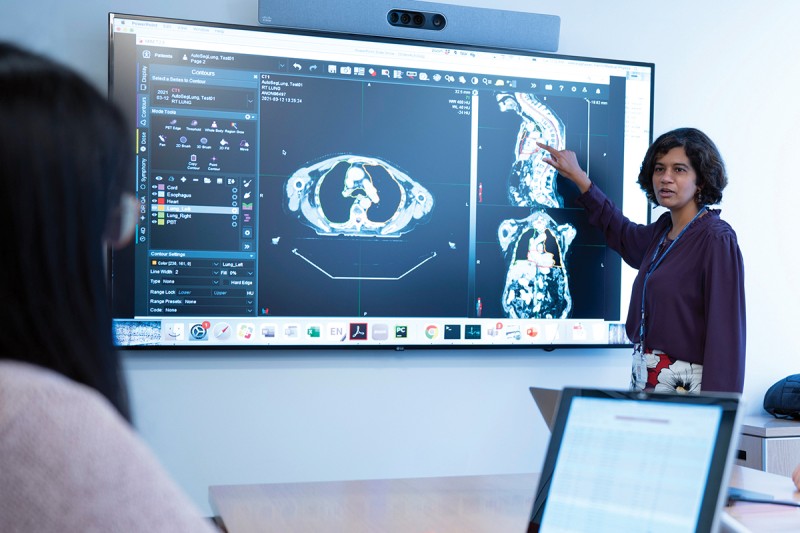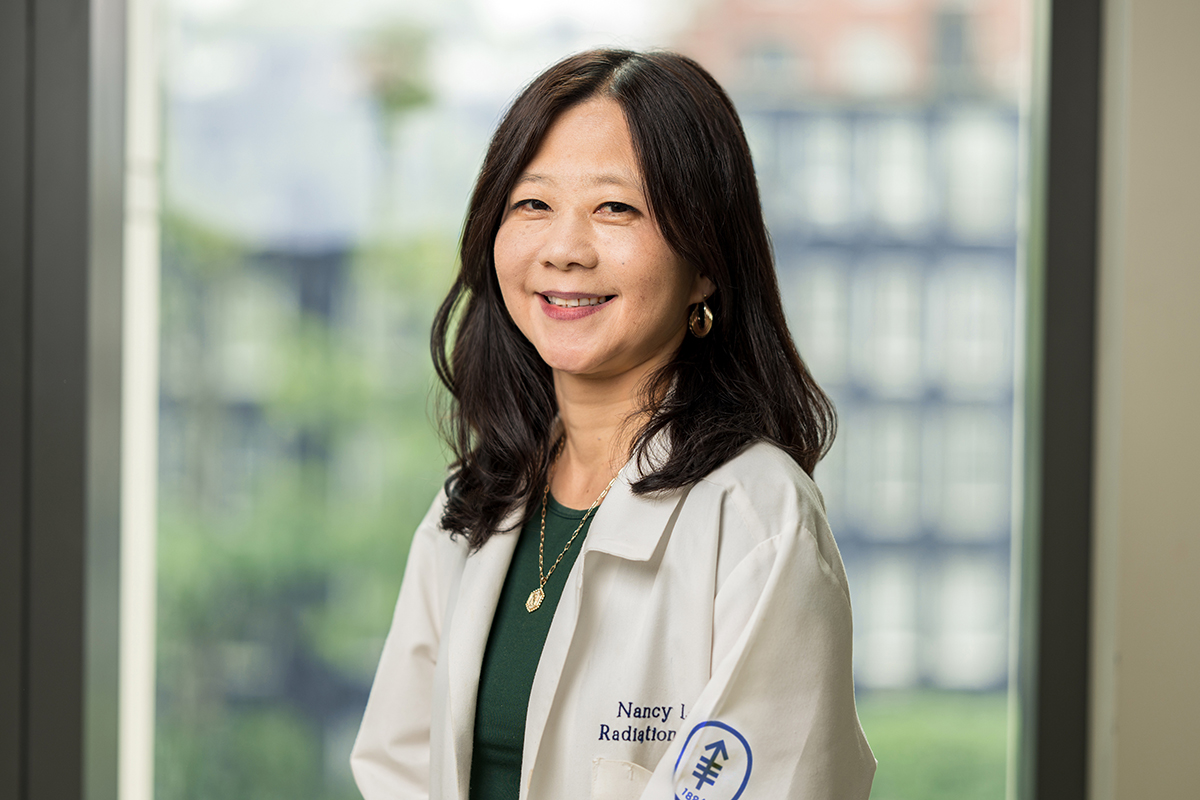
She has helped robots learn to get around indoors and pick up balls from the ground. And she has developed computer programs to monitor traffic at intersections.
But these days, Harini Veeraraghavan, PhD, applies her expertise to fighting cancer. Her lab at Memorial Sloan Kettering Cancer Center (MSK) leads the development of new artificial intelligence (AI) models to improve the targeting of radiation therapy — teaching computers to better isolate tumors and spare more of the surrounding healthy tissue.
In radiation therapy, where high-energy beams are fired at cancer cells, precision targeting is imperative. Every millimeter matters. Yet much of the human body is squishy inside. Organs, especially in the abdomen, naturally move around and change shape from day to day and treatment to treatment.
“It’s actually a very challenging and interesting problem,” says Dr. Veeraraghavan, an associate attending computer scientist in MSK’s Department of Medical Physics. “These organs move quite a bit. Breathing, the contractions that move food through the digestive system, and even water flowing through can alter their shape.”
Overcoming the challenge of accurate cancer radiation targeting, she says, requires developing computer models with a built-in understanding of how organs can change shape and position.
“Currently, we’re developing a virtual digital twin that would model how a patient’s abdominal organs move so we can better plan their treatment and ensure that the right doses of radiation are being delivered to precisely the right places,” she says.
How AI Is Being Used To Make Radiation Targeting Better
And the abdomen isn’t the only area where Dr. Veeraraghavan’s innovations are being used. The research is already being applied by MSK radiation oncologists across more than 40 tissue types — including in head and neck, lung, pancreatic, liver, and prostate cancers, says Joseph Deasy, PhD, Chair of the Department of Medical Physics.
Dr. Veeraraghavan leads a multidisciplinary effort, which includes radiation oncologists and other physicists, to safely implement novel AI technology in the clinic. The technology is used to guide hundreds of radiotherapy treatments given at MSK each day, making it a great example of the positive impact AI is already starting to have in medicine, Dr. Deasy adds.

Nancy Lee, MD, MSK’s Chief of Head and Neck Radiation Oncology, says the algorithms have been a great help in treating patients with head and neck cancer.
In the past, doctors had to identify a patient’s organs in imaging scans by hand — a task often given to residents. Starting with the blank canvas of a CT or MRI scan, they would trace the outlines of a patient’s eyes, nose, teeth, salivary glands, and so forth. This “contouring” process takes hours.
Today, a physician like Dr. Lee can start with computer-generated contours and apply her expertise to tweaking and refining some of the lines and boundaries — making sure tumors are precisely targeted and healthy tissues avoided.
“It’s like having your best resident on the case,” Dr. Lee says. “If you asked 10 human radiation oncologists to contour the same image, there are going to be slight variations among them, even though we’re all experts. The algorithm can help us be even more precise, consistent, systematic, and efficient.”
Deep learning models developed at MSK have been shown to overcome the type of day-to-day variability that can cause not enough or too much radiation to reach a given spot. MSK researchers are also developing AI methods to better track precisely how much radiation a tumor or organ has received to date.
Measuring Tumors With AI
Beyond the normal variability of a person’s organs throughout the course of treatment, MSK doctors and researchers are harnessing the power of AI to better measure how tumors and involved lymph nodes respond to treatments — and in some cases provide early warning that tumors may stop responding to treatment.

“These AI tools will help us to optimize treatment — whether that’s maintaining a therapy or switching to one that will be more effective,” says radiation oncologist Puneeth Iyengar, MD, PhD. “Traditionally, we often have to wait months to determine if a treatment is working. Now we can better predict the effectiveness of treatment weeks or even days into its use.”
The standard method for measuring changes in tumor size is called RECIST — for Response Evaluation Criteria in Solid Tumors. Essentially, a tumor’s size is tracked by measuring a straight line across a cross-section of a tumor at its widest point on an MRI or CT scan.
Newer, computation-driven methods being developed at MSK, however, allow doctors to measure a tumor’s volume in three dimensions, and to track volume changes in multiple tumors over time.
“It’s a much more robust measurement that recognizes that tumors don’t just exist in two dimensions,” Dr. Veeraraghavan says. “It’s like determining changes in the size of a lake by measuring its width at its widest point at different points in time, versus being able to know how many cubic meters of water the lake is actually gaining or losing.”
MSK’s researchers have also been developing AI-driven models to make it possible to measure changes in tumor hypoxia using standard PET scans, rather than a more advanced type of scan called a FMISO PET scan. Tumor hypoxia refers to parts of a tumor that are very low in oxygen — a hallmark that they are becoming more resistant to therapy and more aggressive.
Both types of information can help doctors fine-tune a patient’s radiation treatments in response to changes — and, in some cases, to lower the dose of radiation if a tumor is responding well, which also cuts down on side effects, Dr. Lee says.
These new AI-enhanced approaches are already being used at MSK in the treatment of several types of cancer including head and neck, lung, brain, and metastatic cancer. And MSK is partnering with other institutions to evaluate them in prostate cancer.
“The development and testing of these new approaches is truly a team effort,” Dr. Lee says, “that includes not only myself, Dr. Veeraraghavan, and Dr. Iyengar, but also doctors Daniel Gomez, Helena Yu, Luke Pike, and others.”
The MSK Difference
While AI assistance is quickly becoming the industry standard in radiology, MSK stands apart both for the sophistication and innovation of its AI models as well as for the human expertise it’s paired with, Dr. Veeraraghavan notes.
Dr. Veeraraghavan was awarded two R01 research grants — the gold standard for federally funded research — totaling more than $4 million to further develop MSK’s use of AI in radiation oncology.
The first grant, from the National Cancer Institute, aims to develop new AI tools against lung cancer, offering less radiation toxicity for patients while better targeting tumors in difficult-to-treat locations.
The second, from the National Institute of Biomedical Imaging and Bioengineering and co-led by MSK associate attending physicist Neelam Tyagi, PhD, is to develop a “digital virtual twin” approach to modeling abdominal organs and quantifying radiation doses.
“Together these AI tools will offer unprecedented insights into each person’s cancer to help guide radiation treatment decisions,” Dr. Veeraraghavan says.
Artificial Intelligence 101
- Algorithm: A set of instructions that a computer uses to solve a problem or accomplish a task.
- Artificial Intelligence (AI): Allows programs to apply complex reasoning to make predictions from data.
- Deep Learning: A type of AI trained on neural networks, which are based on models of the human brain. Able to find and learn patterns they weren’t specifically asked to look for.
- Generative AI: Can create images, words, and other content resembling human-created works. Includes popular AI programs like ChatGPT, Midjourney, and DALL-E.
- Machine Learning: Algorithms and models that allow computers to learn patterns and insights from data. Sometimes used interchangeably with “AI.”
Dr. Lee’s research receives essential philanthropic support from the MSK Giving community, including James and Diane Rowen and Nancy and Howard Marks.
Dr. Deasy holds the Enid A. Haupt Chair in Medical Physics.